Another Timbre TimHarrisonbre
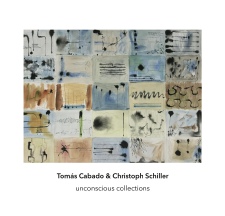
at153 Tomás Cabado & Christoph Schiller - ‘unconscious collections’
Three fresh and engaging pieces recorded during a meeting in Basel in June 2019 of Argentine guitarist Tomás Cabado and Christoph Schiller on spinet. The first piece is an improvisation, the second a composition by Christoph Schiller, and the final piece is composed by Tomás Cabado
1 - june 26th 14:09
2 - from ‘schachtel’ 10:14
3 - basel species 24:33 youtube extract
Interview with Tomás Cabado
How did you meet Christoph and how did the 'unconscious collections' project come about?
Last year I received a grant which enabled me to go to Switzerland for a few weeks to visit and make music with people there who I admire a lot. I visited Stefan Thut in Solothurn, Manfred Werder in Zürich, Jürg Frey in Aarau, and Christopher Schiller in Basel. It was three very intense weeks that made me feel good. I planned some activities with each of them, doing whatever we were interested in, sometimes just talking, sometimes doing something. I proposed to Christoph that we should record together. I’d already met him the last time I’d been in Switzerland in 2017, at his concert series 'atelierkonzerte'. The first thing that excited me about playing with Christoph was the timbral palette of his instrument, the spinet. After a few years of exclusively using electric guitar, I was playing acoustic guitar with steel strings, and the combination seemed nice. But a second interest was to see what happened with the idea of preparations, of which Christoph uses many. Today it’s very common to use preparations - objects to modify the sound or the execution of the instrument - but I had begun to use those objects more because of my affinity for the objects in themselves rather than for their acoustic capabilities. In Buenos Aires, where I live, I spent last year doing concerts in which I just brought along a wooden box, from an old pathé phonograph that I found in my neighbourhood. I put lots of different objects in the box - stones, glass bottles, or little wooden boxes with others things inside, small gifted toy instruments, a recording device. Sometimes I displayed them on a table and played some of them, while also playing recordings. It was a very ethereal work, where I wasn’t composing pieces, just using that set of objects and recordings for each concert - a kind of nomadic activity that I did with my box. That was a special period for me. It was nice, but at the same time I was suffering because I couldn't compose anything - I always kept coming back to these objects, which resist notation.
Once I got to Basel I felt I could write something, which I did using Christoph’s piano - and this was my piece 'species of basel', which appears on the album, but the objects remained outside the piece. There was a very beautiful confluence of ideas, almost by chance, in that encounter with Christoph. On the days I was at his studio he showed me that he had many boxes, where he didn’t keep preparations, but archives of previous works or projects. It’s a fascinating visual and textual documentation, very aesthetically appealing. One of the pieces we recorded comes from one of those boxes. We hadn't thought about this when we talked about the project before seeing each other.
Before my trip I talked a lot with another person whom I admire and love very much, Matías Coduri, an artist who is as interesting as he is invisible – very few people know his work. Talking about my box, he recommended a movie by Christopher Nolan, perhaps his first, 'Following', in which a frustrated writer seeks inspiration by following people, possible characters, down the street. He finally follows a thief, who notices him and then convinces him to break into houses. In a fairly early scene of the movie the thief reveals to the writer that what interests him most about entering those houses are the boxes that people have stored, where they leave small miscellaneous items - notes, earrings and so on - which function as an involuntary presentation of that person’s life, an unconscious collection. This whole universe of things comes together in some way in the recordings we made.
Tell us about your background and how you came to experimental music?
I came to music from music. I never went through something else; I always did this, from the age of five or so. Maybe one day I’ll stop - sometimes I’d like to make documentaries or write, but more and more I realize that my medium is this. My way of having artistic ideas was always musical, even if I don't have many of them, and even though I love philosophy and poetry, and I try to keep in touch with them as much as I can. I also realise that before hearing any music that aesthetically impacted me, I already had contact with the codes of practice: I learned to read music as a child, before playing my instrument (the guitar). I don't know what this means but I feel it has relevance. We discovered each other in parallel, I guess. Thus, predictably there came a time when music settled in me as a "means of expression", as a way of saying "I", which is unavoidable at some point for an artist.
In that way I wanted to study composition, to discover more about that "I". I guess
the question went a long way, because I found experimentalism - first because of
the ideas, as many of us have, reading Cage and Feldman - and I understood that this
"I" is problematic, and that it doesn't necessarily have to be central to the production.
This was not long ago, and it is perhaps what drove me, paradoxically, to produce
and consider myself an artist and composer: to be able to run a little from the "I"
and glimpse something of an "outside". This interested me greatly, but it wasn’t
at all the focus of the composition career I was studying at the time. At the end
of my studies I was a little disappointed and felt I was drifting. I wanted to understand
more and project myself on that field but without many tools. So I simply threw a
little of the thread of some pieces that I had heard on the recommendation of a teacher
until I came across Wandelweiser as a conceptual and aesthetic universe. That made
an impact. I met Antoine Beuger and then many more people, the most beautiful thing
about it being the warmth of everyone, which perhaps is what inspired me most at
that time. Then over time things began to be clearer. I discovered that other Argentine
musicians such as Sergio Merce or Lucio Capece had a relationship with that world,
so it didn’t feel so distant all of a sudden. I began to be able to make this music
in Buenos Aires, with a lot effort and plenty of setbacks, connecting with other
musicians and setting up various projects. The feeling of community sheltered me
in the first years of doing this, and thanks to a number of people from that community
I am able to continue. But sometimes it is that same community who can challenge
you, prompting you to look once more at that "I" to see what's your affiliation with
what you do. I guess I'm at that point now.
You’ve just touched on some of the problems of trying to develop music of this sort within Argentina. Could you tell us a bit more about the experimental music scene there? And do you intend to remain based in Buenos Aires?
I'll only say very general things here. The experimental scene in Argentina is relatively young, and I only entered into it a few years ago. As you can imagine, it's a very underground thing, and it always has been. As I see it, and as happens with many music scenes of this type worldwide, "experimental music" here is a very big label that encompasses free improvisation, mixed media experiments, some sound art, and so on. "Experimental" is not a category used too explicitly but you find it in the language as a common thing, generally mingling with other adjectives such as "spontaneous", perhaps "alternative", and more and more it’s a term that is aesthetically associated with technology. For me at one point the word experimental started to imply a series of consequences aesthetically, politically and philosophically. That is to say: a kind of thought for practice, which is very close to composition. The space for this kind of non-canonic, non-academic aesthetics grows and decreases periodically in Buenos Aires, but this other kind of thought together with a consequent practice, I find, is always rare.
From the side of contemporary music composition, experimentalism never had the same epistemological status in Argentina as, let's say, European ways of writing. Although I find the work of some very important Argentinian composers close to what I understand as experimental procedures, I've always noticed a kind of resistance to identifying with the experimental in the compositive sense, maybe because of its North American connotation - with the exception of Feldman, which is both very loved and very hated here. Identity/identification is a complicated issue for post-colonial Latin America but in this sense I don't see how the identification with European patterns is better.
As for staying here, I don't know. I've been fantasising with the idea of living somewhere else for a long time. Also, there is a lot to do here. Buenos Aires has a very intense cultural life, and artistically the literature and visual art scenes are incredible. There are very good people doing things, even when resources are low. But in experimental music, I feel, I haven't yet found my place. For me that has to be a position where you can be rigorous but also open to others, precise and specific, but not obscure or mysterious. Otherwise you close yourself and it stops being organic, and I have already had that experience. It requires patience, and even then there's no guarantee. At this point there are very promising things happening both here and outside for me. But, going somewhere else, one can dialogue with things from another position, of course, and one can have an analogous experience of the "outside", if you don't give in to the traps of tourism. Many people are going to Berlin now, which is beautiful, but on the other hand people keep saying that the (cultural) space is shrinking and competence is increasing. What does that imply for experimental practices? Can we still be break away from those constraints?
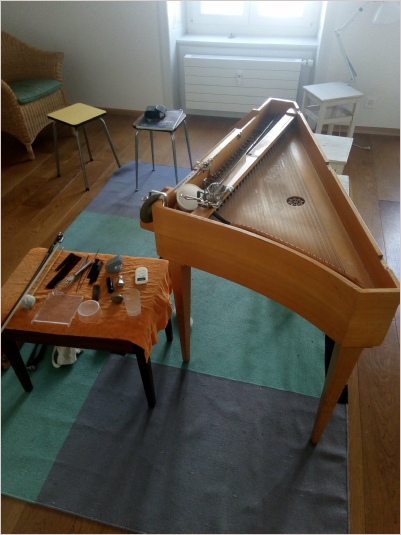
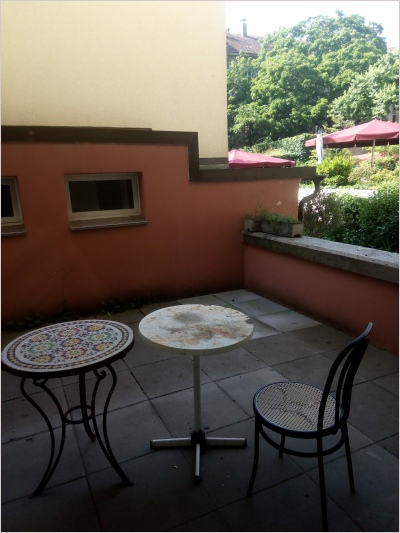
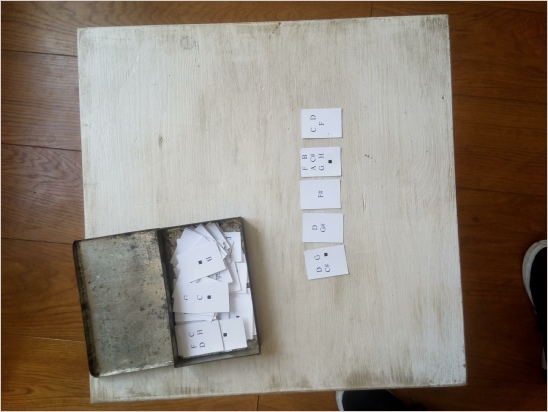
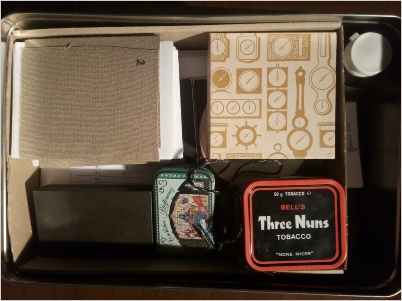
Photographs taken by Tomás Cabado
during the recording day in Basel
with Christoph Schiller